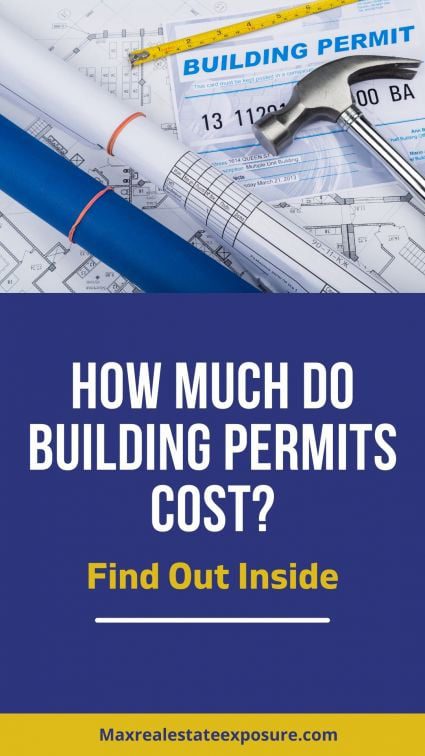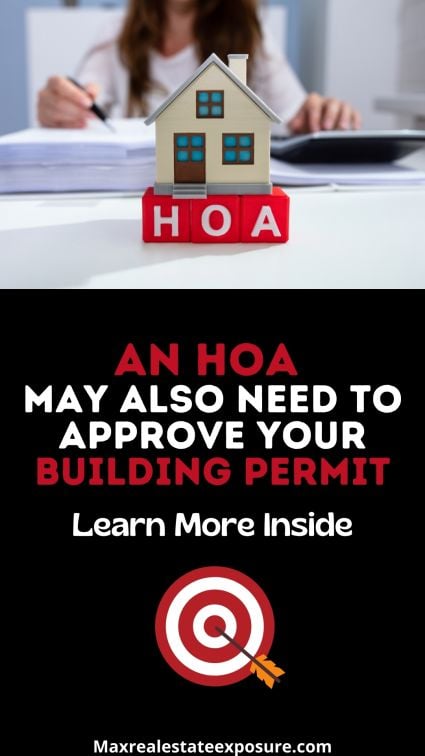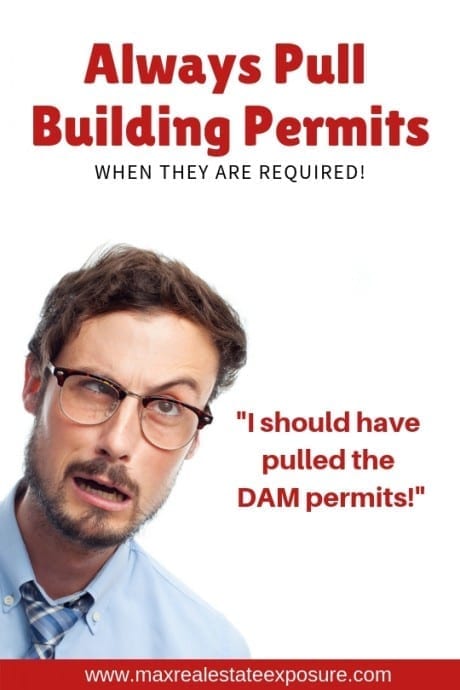 Getting Building Permits For Work at Your House is Vital
Getting Building Permits For Work at Your House is Vital
Did you not pull building permits for work done at your house? Getting a permit for building or improving is crucial.
When you consider making improvements or additions to your home, it can be tempting to try and skirt the permit process.
In some cities and towns, the cost and hassle of getting a building permit can seem unnecessary, especially if you are handy and like to make renovations or you have a friend who offers to do it for you.
Unfortunately, when you try to sell your home, the lack of building permits can be a real problem. Unpermitted work is at the forefront of real estate issues.
Buyers may balk at purchasing a home that does not have permits – fearing that the additions may be unsafe or not follow building codes.
In the end, getting the proper building permits is always a good idea for your construction projects.
A home seller often says, “I’m selling my home. Do I need permits for work I have done”? Unfortunately, the answer is usually yes, you do.
The question then sends us down the road of discussing getting building permits after the fact. Let’s look at everything you need to know about building permits.
What is a Building Permit?
A building permit is a permission from a building official to perform specified renovation projects at your property. Building permit applications are typically made at the local permit office.
A city or town may have the building permit request filed with the local building department or city clerk. A permit must be granted before the work can begin.
Depending on the type of project, a project plan may be required. The local government will determine when they need a plan review or not. A permit fee will be collected at the time of the application process.
Permit costs will vary depending on the scope of the home improvement project. Construction work cannot commence until the appropriate permit is granted. The building project must follow the local building code and usually the International Residential Code.
Depending on the project’s scope, most work where a building permit is required will be performed by a licensed contractor. Small projects could be completed by a homeowner, depending on the improvement.
Rules on necessary permits are determined from community to community. Required permits could be different from one city or town to the next. Once you have received your building permit, there is typically a time frame for the work to be completed.
Usually, projects need to be started between six months to a year. Building permits must be closed out between a year and a half, depending on the project’s complexity.
To get a building permit for a home improvement project, you will need to follow the local municipality's exact procedures.Click To TweetSteps to Getting a Building Permit
Understanding how to get a building permit for your job is pretty straightforward. You will want to compile the necessary information to get the license. This will include the following:
- All of your contact information
- The address where the work will take place and your address if different
- The description of the work taking place
- Name of the architect, if needed
- The name of the general contractor if using one
- Any project drawings
- The timeline of your project
It is usually wise to go in and speak with the building department before submitting a formal application to understand their procedures. Once you are ready, you’ll fill out a building permit application form.
If you live in a condo or a townhouse, you might need approval from the association before submitting your application. The application and the applicable fees will be submitted along with your plan.
The countdown is now on for getting your permit request approved by your local municipality. It is possible they could ask for additional information during the process. If, for some reason, your application request is denied, they will tell you why, along with a time frame to resubmit your application.
You must follow the building inspectors’ requests to get your permit.
Why Are Building Permits Required?
Building permits are required to ensure that work is conducted to provide safety to the public. A building permit helps to ensure that work is completed in compliance with construction, building, and local zoning codes.
Building permits are required when building new construction and improving existing structures. Residential building permits are also needed when adding accessory structures or new addition.
The building permit process must also be followed when doing significant repair work on a property. Any structural or mechanical work will require permits. Public health will always be a chief concern in getting building permits.
Building permits are public information. You can see building permit records on a property field card in your local town hall.
The good news for consumers is they can check if the required permits for work were pulled.
What Projects Need a Building Permit?
 One of the most commonly asked questions is what project do you need a building permit for?
One of the most commonly asked questions is what project do you need a building permit for?
You can expect to be required to have a permit whenever you are adding or removing walls, making structural changes, changing plumbing, adding a structure, finishing a basement, or when demolishing a portion of your house.
In the case of a demolition, there will be a special demolition permit required.
Let’s examine some popular questions people ask about whether a permit is needed.
Do You Need a Permit to Build a Deck?
Yes, you do. As mentioned, cities and towns must ensure a significant structural addition, such as a deck or porch, is built according to the International Building Code and local ordinances. The safety of the public is at stake with those who are standing on a deck.
Ensuring building codes are followed increases the odds of no injuries due to poor construction.
Do You Need a Permit to Build a Shed?
Generally speaking, you will not need a building permit for a shed in most places. Building codes vary by location, so you should check to ensure a shed permit will not be required.
Calling a more prominent structure a “shed” will also not work. In other words, adding a family building and calling it a shed will probably be called out.
You could be slapped with a stop-work order and face a fine. The building inspector will then ask you to follow the permit requirements.
Do You Need a Building Permit to Build a Fence?
Whether you need a building permit for a fence will depend on where you live. Some communities will require a permit for a fence; others will not. A few common factors determining whether you need a permit are the height of the fence and where it will be located.
If you are located in the city, the chances are greater you will need a fence permit. If you are in the suburbs, you are less likely to need a permit. A short fence for privacy will often not require a permit, while a tall fence over six feet on your neighbor’s border probably will.
A small decorative picket fence in your front yard probably will not need a permit. The bottom line is to check with the local building department to ensure you comply with their rules.
Do You Need a Building Permit to Construct a Patio?
You may or may not need a permit to build a patio. The local building official will make the determination. You will be less likely to need a license if the patio is less than 30 inches high.
A covered patio usually has different permitting requirements than an open one.
Check with your town or city to know the exact permit requirements for a patio.
Do You Need a Building Permit to Replace Windows?
The answer depends on what you are doing. You will need a permit in most places if you change your windows completely. For example, if you are going from double-hung windows to casement windows.
You may not need permission if you are swapping out one window for the exact make and model. Likewise, a permit is unlikely required if you change the sash or other parts.
What Are Examples of Things That Don’t Need Permits?
You can make numerous improvements to your home that will not need a permit. Some examples are as follows:
- Changing your carpets
- Painting rooms
- Replacing cabinets
- Replacing most appliances
- Repaving your driveway
- Adding a walkway
- Adding most landscaping
- Staining your deck
How Much Does Building Permits Cost?
 A common question is how much will a building permit cost. The cost of a building permit depends on the complexity of the project. The price of a building permit for constructing a new house will be substantially different from doing some electrical work.
A common question is how much will a building permit cost. The cost of a building permit depends on the complexity of the project. The price of a building permit for constructing a new house will be substantially different from doing some electrical work.
Smaller projects around your home could cost a few hundred dollars, while an added new building or substantial addition could easily be over $1000. The cost of a building permit for a new home is often based on the square footage.
For example, a building permit’s price will double if you have 4000 square feet vs. 2000 square feet.
In many communities, the price of a permit will be based on the cost of the work. Cities and towns often charge X dollars per $1000 of the estimated construction cost.
Items such as decks, porches, garages, roofing, windows, siding, swimming pools, etc., could all be based on the improvement cost. You can expect the building permit cost to range from $100-400 for small jobs in most places.
Building permit costs will range between $500-$2500 for larger, more involved projects. Different types of projects will have varying prices depending on where you live.
Permits on residential buildings may also have a different cost structure than commercial work.
How Long Does it Take to Get a Building Permit?
Similar to the cost of a building permit, the time it takes to get one can vary from community to community. For a minor improvement, it may be possible to have the local department of buildings process it on the same day.
Some locations have a quick review process, and others do not. Getting a permit could take months for more significant home additions or structural changes. If the local building department requires a construction plan, that could add to the time frame.
When homes are located in historic districts, there may be another added layer to getting a permit. In many places, the local historical commission may have some say in obtaining a permit for your work.
Determining if they play a role in issuing permits will be essential.
Do I Need to Hire Someone to Get a Permit?
No, you do not. You can file for the permit yourself if you can do your own work. A building owner can file the permit application for work they are legally allowed to do themselves. For more substantial projects, a general contractor will pull the permit for you.
In some cities getting building permits can be severely challenging, with many hoops to jump through. In such cases, permit specialists will get the necessary permits for you.
A permit specialist typically charges $50-$75 an hour to expedite their permitting.
Zoning Issues Can Affect Permitting on Larger Projects
You’ll need to follow local zoning laws whenever you make a substantial addition to your home, like adding a garage. For example, it may be crucial to locate your property lines to ensure you don’t infringe on the neighbor’s property.
A professional engineer must be hired to conduct a land survey when adding a significant structure, such as an addition or swimming pool. Even when getting a fence permit, you may realize a property survey must be done.
It is not uncommon for a zoning ordinance to become part of the approval process. Easements can also play a role in getting a permit for your project. Common easements include those for power lines, sidewalks, sewer systems, and others.
Homeowners Associations May Need to Approve Your Building Permit
 If an HOA governs your neighborhood, you may also need their permission when modifying an existing building or home. It will be essential to make a phone call to the head of the homeowners association to clarify any work you plan on doing.
If an HOA governs your neighborhood, you may also need their permission when modifying an existing building or home. It will be essential to make a phone call to the head of the homeowners association to clarify any work you plan on doing.
There are also subdivisions and planned communities where you must examine the conditions, covenants, and restrictions (CCRs).
Sometimes permit requirements must be followed by entities besides the local building official.
Can Building Permits Be Transferred?
Usually, yes, a building permit is transferable. Again, the procedure will depend on the local agencies giving permits.
If the same building contractor is going to be doing the work, it is unlikely a city or town would prohibit the transfer of the building permit.
Someone might want to transfer a building permit if they were in the middle of selling a home, and the ownership transfer will occur before the work is done.
It will be vital to check with the local building official how they handle the transfer of permits.
The Temptation Of Avoiding Permits
The temptation to avoid getting a permit for home improvements is something every owner faces at one point or another. It is understandable, as the cost of home improvements and additions are already high in many cases.
The permit process can seem like a pain, including the inspection to verify the work is up to standards. It may take some time to complete the process, but you may not feel like you have it.
Those most tempted to avoid permits are homeowners interested in saving money by doing the work themselves or bringing in a friend who has experience in home repair and renovation.
The friend – or inexpensive contractor you hire – may imply that you do not need to worry about getting a permit. This, of course, is WRONG!
The Real Reason Why Most Don’t Pull Building Permits
The real reason that many homeowners don’t pull permits isn’t that of paying a few hundred bucks to the town hall or the inconvenience that comes with it. Nearly every city and town in America collects taxes based on the assessed value of a home. The estimated value is calculated by looking at the size and characteristics of a property.
What is the gross living area? How many bedrooms does it have? How many bathrooms? These are all factors in determining an appropriate assessed value.
Guess what happens when the tax assessor knows about the luxurious new finished basement with home theater, wet bar, home gym, and beautiful bath you just added.
If you guessed your tax assessment is going up, you are 100 percent correct.
When no permits have been pulled, the town most likely will not find out, and your taxes will not take the upward climb they would have otherwise.
Homeowners can save thousands of dollars throughout owning a home when permits are not pulled. When selling a home, this becomes very problematic. If and when the town or city finds out about it, the new owner is the one who will bear the brunt of the increased taxes paid.
This will often lead to appealing high property taxes. If the town has not collected taxes in years, it may be harder to get a justified abatement.
Most of the time homeowners skip out on getting building permits to avoid the increase in property taxes that come with their improvements.Click To TweetThe Problem With Not Getting Building Permits
There will usually be a home inspection and an appraisal conducted by certified professionals when you sell your home. This is just part of the selling process, and it helps buyers know what they are getting into before they buy the house.
The inspector and appraiser will likely go over your house with a fine-toothed comb, looking over every area to verify that the home is in good working order – sometimes even checking all public records on the home.
There are no requirements for the home inspector or appraiser to check on permits for improvements to the home, but this does not mean someone will not ask about them.
The inspector, the appraiser, the buyer, and the bank doing the lending can request public records from your home, including the permits that have been acquired for the home.
A good buyer’s agent should always ask if permits were pulled when a significant addition or finished basement was added. These types of improvements can significantly impact a new owner financially.
You can run into significant problems when someone discovers that renovations were done to the home without permits. This can stop a home sale. There is an exceptionally high risk of being found if the improvements were made recently.
The appraiser can see what the house consisted of when you bought it and noticed no extra en suite bathroom, deck, or finished basement. The bigger the addition or improvement to the home, the more likely it is to see that something is off.
Buyers Want Certified Work With Proper Building Permitting
 Unless you are in an extremely tight housing market, where buyers are desperate and take anything, you can expect people to be concerned with any improvements that do not have the proper permits.
Unless you are in an extremely tight housing market, where buyers are desperate and take anything, you can expect people to be concerned with any improvements that do not have the proper permits.
A lack of permits implies several problems for potential buyers, including safety and quality issues.
Safety Concerns Without Building Permits
Customers want to move into a safe home. They may be planning to start a family or already have children. They may be uneasy about any work not done by a certified professional.
Part of the permit process is intended to verify that the improvements to a home were correctly made, according to regulations, by someone who knows what they are doing.
Knowing that all safety rules and standard building practices were observed gives buyers peace of mind. Another would be hiring the local handyman to do electrical wiring a licensed electrician should have done.
In some cases, it is even possible that you may not have home insurance coverage if there is a major catastrophe like a fire. The perfect example is the owner who goes out and buys a wood stove for the fireplace and doesn’t bother to pull an installation permit with the fire department.
Good luck getting an insurance claim if the insurance company finds out there are no permits and the stove was the cause of the fire.
Quality Concerns With No Building Permits
Safety may be the first thing buyers think about when they see you lack permits, but questions about the quality of the work will come quickly after.
Your lack of a permit makes buyers think you were trying to cut corners. You may have hired someone not fully qualified to do the work, or you may have done the job yourself and not know what you were doing.
Whatever the truth is, buyers will suspect shoddy craftsmanship when there is a missing permit. No one wants to pour hundreds of thousands of dollars into a home with poorly crafted improvements.
A good example is all the homeowners who had to deal with removing ice dams every time there was a brutal winter. There are many negative things ice dams can do to a home, including mold. In cases where mold is terrible, walls may need to be removed and rebuilt.
If it is bad enough, you may need to relocate or replace the electrical wiring. Could a homeowner fix this themselves? I am sure many have. That doesn’t mean hiring a professional who pulls a permit for this work is wrong.
What Happens When I Don’t Have Building Permits
One of the questions homeowners often ask when they are considering selling is what will happen if they don’t have a building permit for work done on their home.
There is no clear-cut and dry answer on this, but the local city or town will ask the homeowner to go through the permitting process, in my experience.
Getting building permits after the fact can be a bit of a hassle, but it is better than losing a sale.
The owner will, of course, have to pay all necessary fees involved with the construction. The applicable inspectors will also need to come through and inspect the work.
Many homeowners ask this question because they want to know if the town will make them rip out everything they have built and start from scratch. In my thirty-seven years of selling real estate, I have not experienced this.
That, however, does not mean it is not possible. Homeowners should be apologetic to the local building department when they discover no permits have been pulled.
What Are Additional Risks of Not Pulling Building Permits
 One of the other risks of not pulling permits is getting sued later on down the road by the buyer who purchases your home. Unfortunately, we live in a sue-happy society where people always look for someone to blame.
One of the other risks of not pulling permits is getting sued later on down the road by the buyer who purchases your home. Unfortunately, we live in a sue-happy society where people always look for someone to blame.
When you don’t pull a permit, and something tragic happens years later, who do you think they’ll come after?
In Massachusetts, when selling a home, it is standard practice that homeowners fill out a form called the “sellers statement of property condition.” Lots of states use these forms.
They are primarily a disclosure of what the seller knows and doesn’t know about the home. One of the first questions on this form asks, “have you done any work on the home in which a permit was required.” You better answer this one, folks, for the reason I mentioned above!
When Do I Need to Pull a Building Permit?
As previously discussed on some items above, there is no clear-cut and dry answer on when you need to pull a building permit to improve your home.
The best way to find out is to pick up the phone and call the local building department or stop in for a face-to-face. The building inspector should quickly tell you whether you need a permit for your project.
It is safe to assume that anything safety-related will require a permit. You can also expect a permit to be necessary when doing something significantly altering your home.
When all the work has been completed, one crucial reminder is not to forget to have a final inspection and get the permit closed out!
Over the years, several clients have done the right thing and pulled a building permit but never closed it once all the work was completed.
Closing out a permit is often called getting a certificate of occupancy. Recently while selling a home in Bellingham, Massachusetts, I ran into this exact situation.
The owner pulled an original building permit but never asked for a final inspection, so the project was never filed as completed. Luckily, the building department did not make them do anything special except get a last review.
However, you could find yourself in a situation where you are not so lucky if there are code changes between when the permit is pulled and when you sell your home.
Make sure when the project is completed, a final inspection is done, and a certificate of occupancy is issued.

Getting Building Permits Is Easier Than You Think
Your city or town wants you to get permits for all your work in your house, just like buyers do. The permit process is probably not as complicated or as costly as you first imagined.
You need to bring in the city building inspector to examine the work and get them to approve it, then pay your fee for the permit.
In many locations, including Massachusetts, you will pay permits for various construction phases like electrical and plumbing.
In other words, if applicable, you may pay a fee for the general building inspection and plumbing and electrical inspection costs.
As long as the work is up to par, the only genuine inconvenience will be the fee. But even the costs are not high in most cases. They may be as little as 2% of the cost of the improvements.
When you improve your house, you should factor in permits as a matter of course.
Doing this will ensure the work is up to standard – something you and anyone considering buying your house will appreciate. When you go to sell, you will have one less thing to worry about.
In summary, if anyone tells you that getting a building permit is something you should skip and not worry about, they are flat-out wrong!
Do yourself a favor and get building permits for any work that is legally required to do so. When it comes time to sell, you will be glad you did.
Final Thoughts on Building Permits
Never underestimate the importance of pulling the required building permits. Unpermitted work can cause a home sale to fall through or put you through needless stress and aggravation.
Hopefully, you now have a much better understanding of the permitting process and the steps you need to take to get a permit.
Additional Important Home Selling Articles
- What are the improvements that increase a home’s value? – Get a detailed overview of the amenities you can add to your home to make the most significant difference in market value.
- When a permit is required and when it’s not – see more helpful advice on when you need a building permit and when you don’t.
Use these additional resources to make intelligent decisions surrounding your home. Above all else, remember that the lack of permits can and does stop home sales from happening!
About the author: Bill Gassett, a nationally recognized leader in his field, provided the above Real Estate information on what is a building permit and how to get one. Bill can be reached via email at billgassett@remaxexec.com or by phone at 508-625-0191. Bill has helped people move in and out of Metrowest towns for the last 37+ Years.
Are you thinking of selling your home? I am passionate about Real Estate and love sharing my marketing expertise!
I service Real Estate Sales in the following Metrowest MA towns: Ashland, Bellingham, Douglas, Framingham, Franklin, Grafton, Holliston, Hopkinton, Hopedale, Medway, Mendon, Milford, Millbury, Millville, Natick, Northborough, Northbridge, Shrewsbury, Southborough, Sutton, Wayland, Westborough, Whitinsville, Worcester, Upton, and Uxbridge MA.

